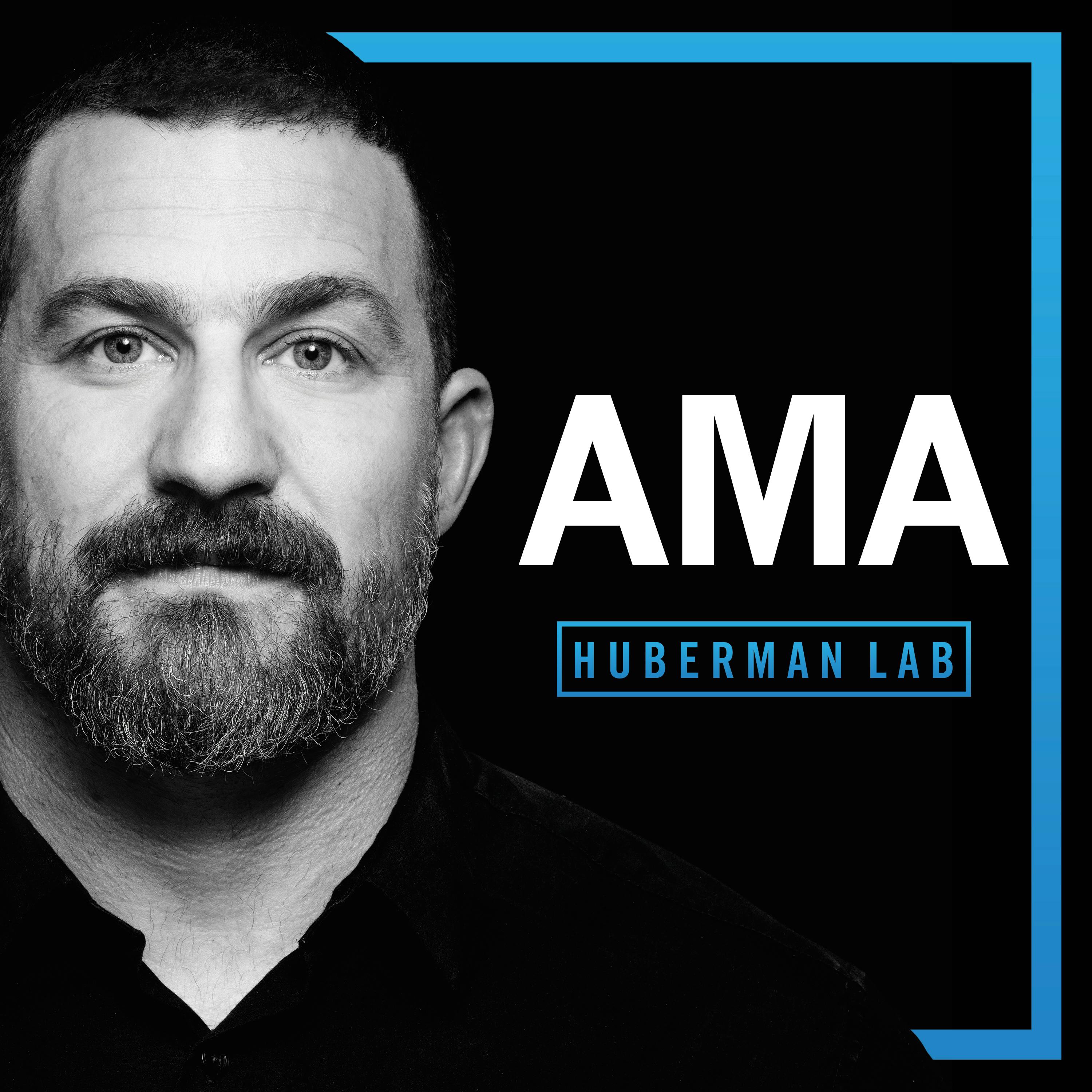
February 24, 2023 • 23min
AMA #4: Maintain Motivation, Improve REM Sleep, Set Goals, Manage Anxiety & More
Huberman Lab

Key Takeaways
- Dopamine is essential for motivation - It controls our willingness to put in effort to pursue goals
- Maintaining consistent motivation requires managing dopamine levels - Avoid extreme peaks and crashes
- Key tools to replenish dopamine and motivation:
- Quality sleep
- Non-sleep deep rest (NSDR) practices
- Avoiding excessive layering of dopamine-stimulating activities
- Find a sustainable work rhythm - Determine how many hours of focused work you can consistently do and stick to it
- As you gain expertise, you may be able to do more impactful work in less time - Don't always try to increase work hours
Introduction
In this Ask Me Anything (AMA) episode, Dr. Andrew Huberman addresses a question about maintaining consistent motivation over long periods of time. He explains the neuroscience behind motivation, focusing on the role of dopamine, and provides practical tools and strategies for avoiding extreme fluctuations between high and low motivation states.
Topics Discussed
The Neuroscience of Motivation (02:00)
Dr. Huberman begins by explaining that motivation is closely tied to dopamine levels in the brain. He uses an analogy of dopamine as a reservoir or wave pool:
- Dopamine reservoir: The baseline level of dopamine available
- Waves: Represent bursts of motivation and goal-directed behavior
- Too large waves: Can deplete the reservoir, leading to crashes in motivation
He emphasizes that while we can't objectively measure others' motivation levels, we can think of our state in terms of being:
- Back on our heels (struggling)
- Flat-footed (doing okay)
- Forward center of mass (tackling things effectively)
The Role of Dopamine in Motivation (04:00)
Dr. Huberman delves deeper into how dopamine affects motivation:
- Low dopamine: People are unwilling to put in effort to pursue goals
- Adequate dopamine: People will put in effort to reach goals
- Excessively high dopamine: Can lead to pathological behavior (e.g., manic episodes)
He stresses the importance of maintaining appropriate dopamine levels to sustain motivation without burning out.
Tools to Replenish Dopamine and Motivation (06:01)
Dr. Huberman outlines three key tools for maintaining healthy dopamine levels:
- Quality sleep
- Aim for adequate slow-wave and REM sleep
- Individual needs may vary (6-8 hours or more)
- Non-sleep deep rest (NSDR) or Yoga Nidra
- Shown to increase striatal dopamine reserves
- Can be done in as little as 10 minutes, but longer sessions (30-60 minutes) may be more beneficial
- Improves confidence and cognitive performance
- Managing dopamine stimulation
- Be cautious about layering too many dopamine-stimulating activities
- Examples: caffeine, music, supplements, medications
He emphasizes the importance of replenishing dopamine before complete depletion, as it takes much longer to restore from a fully depleted state.
Cautions About Dopamine Stimulation (10:02)
Dr. Huberman warns against relying too heavily on substances or activities that strongly stimulate dopamine release:
- Prescription stimulants (e.g., Adderall, Ritalin)
- Illegal substances
- Some supplements (e.g., mucuna pruriens)
He advises caution with combining multiple dopamine-stimulating factors, as this can lead to crashes and depletion.
Implementing NSDR for Dopamine Replenishment (12:03)
Dr. Huberman provides more details on using NSDR:
- Can be done any time of day
- Different from meditation (which is a focus exercise)
- Restores energy through the dopamine system
- May help recover lost sleep
- Improves confidence and cognitive performance
He recommends doing NSDR daily, especially when not feeling depleted, to maintain dopamine levels.
Balancing Dopamine Stimulation (14:03)
Dr. Huberman discusses the risks of combining too many dopamine-stimulating activities:
- Caffeine
- Music
- Supplements (e.g., L-tyrosine)
- Medications
He explains that while these aren't necessarily bad on their own, stacking them can lead to big dopamine peaks followed by crashes, making it harder to maintain consistent motivation.
Developing a Sustainable Work Rhythm (16:03)
Dr. Huberman shares advice from neurologist Robert Knight on maintaining a consistent work schedule:
- Determine how many hours of focused work you can do consistently (e.g., 5 days a week)
- Stick to that schedule
- Reassess and update every 4-5 years
He notes that as you gain expertise, you may be able to do more impactful work in less time, rather than constantly increasing work hours.
Adapting Work Capacity Over Time (18:03)
Dr. Huberman draws an analogy to resistance training:
- Beginners may need more volume to see results
- Experts can achieve more with less time due to improved efficiency
He emphasizes the importance of finding a sustainable rhythm that allows you to maintain mental and physical health.
Conclusion and Premium Channel Information (20:03)
Dr. Huberman wraps up by explaining the purpose of the Huberman Lab Premium channel:
- Support the standard podcast
- Fund human research on mental health, physical health, and performance
- Provide in-depth answers to listener questions
- Offer exclusive content and transcripts
He mentions the Tiny Foundation's dollar-for-dollar match for research funding raised through the premium channel.
Conclusion
Maintaining consistent motivation requires a deep understanding of how dopamine affects our brain and behavior. By implementing strategies to manage dopamine levels - such as prioritizing quality sleep, practicing NSDR, and being mindful of dopamine stimulation - we can avoid extreme fluctuations in motivation. Additionally, finding a sustainable work rhythm that matches our current capabilities and expertise level is crucial for long-term success and well-being. Remember that as you gain mastery in your field, you may be able to accomplish more meaningful work in less time, so don't always push for increased work hours. By following these principles and regularly reassessing your approach, you can cultivate a more stable and productive motivational state.







